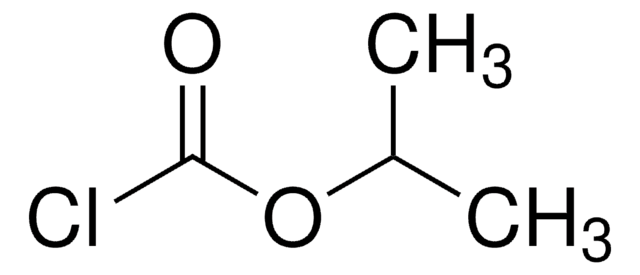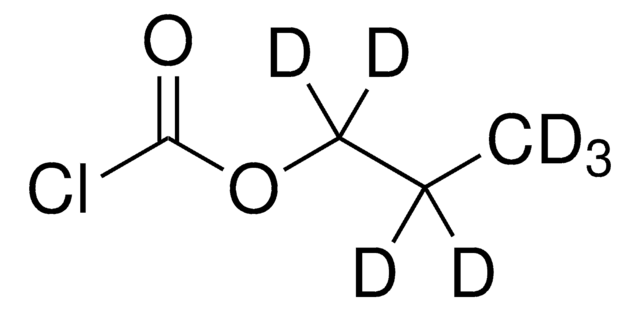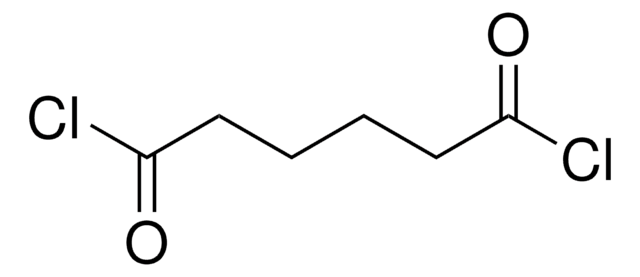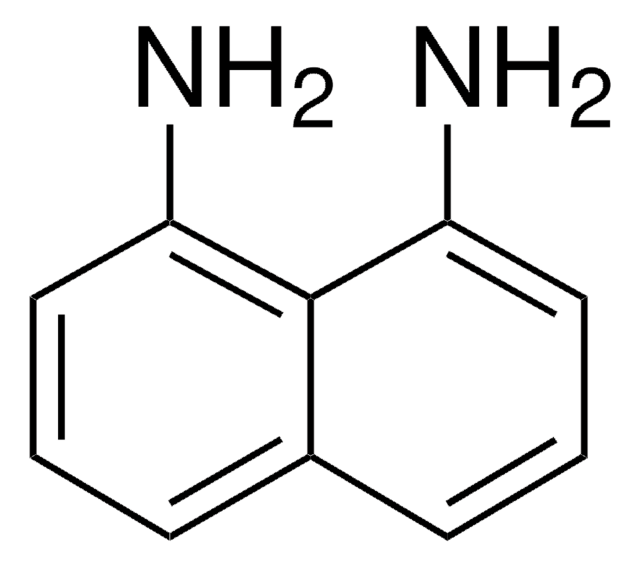All Photos(3)
About This Item
Linear Formula:
ClCO2CH2CH2CH3
CAS Number:
Molecular Weight:
122.55
EC Number:
MDL number:
UNSPSC Code:
12352100
PubChem Substance ID:
NACRES:
NA.22
Recommended Products
vapor pressure
0.87 psi ( 20 °C)
Assay
98%
form
liquid
refractive index
n20/D 1.404 (lit.)
bp
105-106 °C (lit.)
solubility
benzene: miscible(lit.)
chloroform: miscible(lit.)
diethyl ether: miscible(lit.)
density
1.09 g/mL at 25 °C (lit.)
storage temp.
2-8°C
SMILES string
CCCOC(Cl)=O
InChI
1S/C4H7ClO2/c1-2-3-7-4(5)6/h2-3H2,1H3
InChI key
QQKDTTWZXHEGAQ-UHFFFAOYSA-N
Application
Propyl chloroformate has been used:
- as derivatization reagent in quantification of dopamine, serotonin and norepinephrine in human urine by solid phase microextraction-gas chromatography-triple quadrupole mass spectrometry
- in the preparation of dipropyl 3,6-diphenyl-1,2-dihydro-1,2,4,5-tetrazine-1,2-dicarboxylate
Signal Word
Danger
Hazard Statements
Precautionary Statements
Hazard Classifications
Acute Tox. 3 Inhalation - Acute Tox. 4 Oral - Eye Dam. 1 - Flam. Liq. 2 - Skin Corr. 1B
Storage Class Code
3 - Flammable liquids
WGK
WGK 1
Flash Point(F)
71.6 °F
Flash Point(C)
22 °C
Personal Protective Equipment
dust mask type N95 (US), Eyeshields, Gloves
Choose from one of the most recent versions:
Already Own This Product?
Find documentation for the products that you have recently purchased in the Document Library.
Guo-Wu Rao et al.
Acta crystallographica. Section C, Crystal structure communications, 59(Pt 5), o281-o282 (2003-05-14)
The title compound, C(22)H(24)N(4)O(4), was prepared from propyl chloroformate and 3,6-diphenyl-1,2-dihydro-s-tetrazine. This reaction yields the title compound rather than dipropyl 3,6-diphenyl-1,4-dihydro-s-tetrazine-1,4-dicarboxylate. The 2,3-diazabutadiene group in the central six-membered ring is not planar; the C=N double-bond length is 1.285 (2) A
Jake P Violi et al.
Ecotoxicology and environmental safety, 172, 72-81 (2019-01-27)
Environmental exposure to the amino acid β-methylamino-L-alanine (BMAA) was linked to the high incidence of neurodegenerative disease first reported on the island of Guam in the 1940s and has more recently been implicated in an increased incidence of amyotrophic lateral
Yixing Sui et al.
Bioresource technology, 275, 145-152 (2018-12-26)
The microalga Dunaliella salina has been widely studied for carotenogenesis, yet its protein production for human nutrition has rarely been reported. This study unveils the effects of growth phase and light regime on protein and essential amino acid (EAA) levels
Brendan J Main et al.
Harmful algae, 74, 10-18 (2018-05-05)
The emerging toxin β-methylamino-l-alanine (BMAA) has been linked to the development of a number of neurodegenerative diseases in humans including amyotrophic lateral sclerosis (ALS), Alzheimer's disease, and Parkinson's disease. BMAA has been found to be produced by a range of
Laura Louise Scott et al.
Neurotoxicity research, 33(1), 6-14 (2017-05-05)
Chronic inhalation of aerosolized β-N-methylamino-L-alanine (BMAA) could serve as potenital route for exposure to this cyanobacterial neurotoxin implicated in the development of neurodegenerative disease. We investigated environmental aerosol BMAA loads and the fate of inhaled isotopically labeled aerosolized BMAA in
Our team of scientists has experience in all areas of research including Life Science, Material Science, Chemical Synthesis, Chromatography, Analytical and many others.
Contact Technical Service











